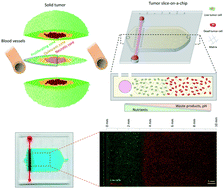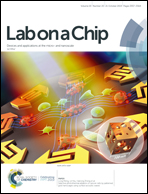Tumor-on-a-chip: a microfluidic model to study cell response to environmental gradients†
Abstract
Limited blood supply and rapid tumor metabolism within solid tumors leads to nutrient starvation, waste product accumulation and the generation of pH gradients across the tumor mass. These environmental conditions modify multiple cellular functions, including metabolism, proliferation, and drug response. However, capturing the spatial metabolic and phenotypic heterogeneity of the tumor with classic in vitro models remains challenging. Thus, in this work a microfluidic tumor slice model was developed to study cell behavior under metabolic starvation gradients. The presented microdevice comprises a central chamber where tumor cells were cultured in a 3D collagen hydrogel. A lumen on the flank of the chamber was used to perfuse media, mimicking the vasculature. Under these circumstances, tumor cell metabolism led to the generation of viability, proliferation and pH gradients. The model decoupled the influence of oxygen from other nutrients, revealing that cell necrosis at the core of the model could be explained by nutrient starvation. The microdevice can be disassembled to retrieve the cells from the desired locations to study molecular adaptions due to nutrient starvation. When exposed to these pH gradients and low nutrient conditions, cancer cells showed multiple changes in their gene expression profile depending on their distance from the lumen. Those cells located further from the lumen upregulated several genes related to stress and survival response, whereas genes related to proliferation and DNA repair were downregulated. This model may help to identify new therapeutic opportunities to target the metabolic heterogeneity observed in solid tumors.



 Please wait while we load your content...
Please wait while we load your content...